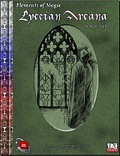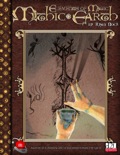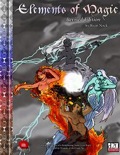
Elements of Magic II: Lyceian Arcana (d20) PDF
EN Publishing
Our Price:
$8.95
Add to Cart
The sequel to the immensely popular Elements of Magic: Revised is here! (Note that this product is an expansion for Elements of Magic: Revised, EN Publishing's d20 magic system. Lyceian Arcana is not a stand-alone product.)
In an abandoned classroom in the Lyceum, three mages stand together, channeling their energies into a desperate ritual spell. Their enemies, dreamborn monsters bent on destroying the physical world, are half a continent away, seeking an artifact whose location had been sealed in the Lyceum’s vaults. The heroes’ only chance of getting there in time is this daring teleportation. They have been dodging charmed spell duelists and bribed effigist priests all day, and they hope that now they might have enough of a reprieve to perform the dangerous ritual. Their allies and bodyguards look on expectantly.
Suddenly, the doors to the classroom burst open, and in strides a Ragesian inquisitor, ancient and powerful, flanked by a hulking pair of biomantically-created beasts. Magically shielded by his bearskull mask, the inquisitor throws forward his hand with a fierce snarl, and his beasts charge. The bodyguards of the three mages hold the monsters at bay, while a master of the martial art of Tel-Shalanth tumbles across the room, hoping to disrupt the Inquisitor’s energy before he can cast a spell.
Nobody casts magic missile.
E.N. Publishing’s Elements of Magic—Revised Edition gave you a system to create any sort of spell you desired on the fly, breaking free of the traditional forms of d20 magic. In Lyceian Arcana, we present guidelines, examples, and new rules to help you turn that system of game mechanics into any sort of magical world you desire. Discover an academy’s worth of knowledge, including:
- Nine sample magical traditions, including the Dreamers of the Inner Path—mages who draw power from the horrors they find in their dreams—and the Taranesti Diabolists—opportunistic dark Elves who gain their greatest powers by bartering with the infernal.
- Conversions of the core spellcasting classes, to let you use the Elements of Magic system while keeping the same feel in your games.
- Five new magical classes, such as the Godhand—a warrior who receives magical boons from his deity—and the Anima—a flexible class that lets any character imbue herself with permanent magical abilities.
- Twenty-five magical tradition feats, a way to make yourself part of a particular magical tradition far more easily than taking a prestige class.
- Expanded magic item and spellcasting rules. Create intelligent items, or cast powerful spells in massive rituals.
- Information on the Lyceum itself, an academy devoted to teaching diverse magical knowledge, and a perfect way to introduce the Elements of Magic system to an existing game.
|

Elements of Magic: Mythic Earth (d20) PDF
EN Publishing
Our Price:
$8.95
Add to Cart
Elements of Magic—Mythic Earth gives you the rules to create magic as it is seen in the myths that are alive in every setting, ancient or modern. Mythic Earth presents rules compatible with both Fantasy d20 and Modern d20, and is an update of the flexible spell creation system of Elements of Magic. Additionally, whether you want to explore the myths of the real world, or you want to play in a fantasy world of your own creation, this book will help you understand the role myths play in history and society, and will aid you in composing adventures with mythic resonance.
Mythic Earth will help you bring the grandeur of myths and the intricacies of superstition and folklore to life in your games. From street magicians and voodoo priests to Chinese sorcerers and the various stripes of witches, all the magical beliefs of humanity and the infinite worlds of fantasy are yours to wield as you explore the mysteries of Mythic Earth.
Over twenty magical traditions are presented, drawn from the magical beliefs of our own world, though other traditions are easily possible for other worlds. Each magical traditions has some types of magic it is good or bad at, so Christian miracle workers are more likely to be skilled at healing, and Aztec blood mages will be most adept at attack spells. Characters of any class can learn magic, though only those who devote themselves to it will become truly powerful.
Chapter One: Myths introduces some of the common mythic motifs, and discusses how to create games with different styles and interactions of myths.
Chapter Two: Spellcasting and Magical Traditions explains the rules for gaining access to magic and casting spells, and details twenty-three magical traditions from the beliefs of the real world.
Chapter Three: The Magic of HIGH FANTASY provides setting-specific information and rules for magic-users in the HIGH FANTASY campaign, including a new Mage advanced class and sample characters.
Chapter Four: Spells spells out everything you can do with magic.
Appendix One: Mythic Fantasy d20 details how to use the rules in this book in a fantasy game, not a modern game.
|
|

Elements of Magic—Revised Edition (d20) PDF
EN Publishing
Our Price:
$9.95
Add to Cart
The premier magic point system for d20 spellcasting!
Magic defines fantasy. It is the magical that makes a normal story into a fantasy that delights listeners, readers, and gamers by making all the impossibilities we can imagine become real. Dreams of magic can make even the most mundane day something to cherish, like a poem evoking the charm of the everyday world.
But sometimes, just like poems, magic can become stale and clichéd. Through repeated exposure, its novelty can wear off, and certainly, thirty years of magic missiles and fingers of death have been enough to render many fantasy gamers jaded. At its core, saying, “My love is a dove,” in a poem is as trite as, “I cast detect magic.”
Elements of Magic opens the world of magic to you, letting you create almost any type of magic-user you’d like. Magic is an artform, like poetry, and any good poet is never content to merely recite the works of others.
Elements of Magic is modular, able to fit whatever role you want it to play. It can be added to an existing campaign that already has wizards, sorcerers, clerics, and druids, perhaps representing another, higher sort of magic, or it can wholly replace the existing magic system, providing a whole new feel to your fantasy gaming. You will need a d20 core rulebook to use these rules, but this book will let you ignore the old, clichéd spells presented in those books, and create your own works of magical art.
Elements of Magic eliminates the spell memorization and preparation system entirely, replacing it with something bold, new and flexible. This book uses a spell list and magic point system, allowing you to build spells modularly, and letting you decide what the mechanics actually mean.
Elements of Magic is a rules module designed to replace the "fire and forget" spell system of the d20 Core Rules. The d20 spell system, while balanced and usable, is not flexible enough to model the magic users from most fantasy books and movies. Few wizards have ever memorized or prepared a spell, and even fewer forget them immediately afterwards. In Elements of Magic, each character has only a single spellcasting level, no matter how many types of magic she learns in her career. The Elements of Magic gives characters many times the options of the standard d20 rules. Individual spells are replaced by spell lists. Instead of learning a fireball spell, for example, a mage could learn the Evoke Fire spell list, which is very flexible as to its usage and appearance. Nor is the mage limited to fire evocations—with 20 elements to choose from, she could learn Evoke Lightning to stun and damage your foes, Transform Light to make them evaporate into a dim glow, or even exotic combinations of spell lists, such as Create Force/Drain Time, to lock them in a bubble of stasis. It would take thousands of standard spells to duplicate the effects of the spell lists in this 94-page book.
This revised edition of the bestselling d20 sourcebook is finally here!
This is version 1.2 of Elements of Magic—Revised Edition, containing the version 1.1 errata from the original revised edition as well as revised and updated bookmarks and hyperlinks and an entirely new 7-page appendix of errata, changes and augmentations to the system.
Written by: Ryan Nock
|